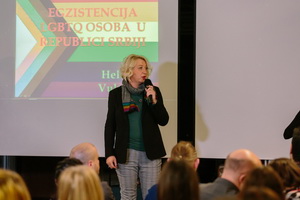 Transcript of the presentation by Helena Vuković at the 41st Belgrade Ignite “Get Involved no. 6” (7 November 2018, Impact Hub, Belgrade)
Transcript of the presentation by Helena Vuković at the 41st Belgrade Ignite “Get Involved no. 6” (7 November 2018, Impact Hub, Belgrade)
Tonight I am here on behalf of a large minority group to explain the most important issues faced by all members of the LGBTQ community in Serbia.
First of all, existence. Existence because that is where everything originates from, from the right to life, right to free movement. Violence against LGBT persons has become more frequent lately, particularly against trans persons – there were 7-8 reported attacks last year. While there is very little talk about daily harassment in the street, discrimination in the workplace, about this silent discrimination. I have felt a lot of in on my own skin. You know, the feeling when they know about you and everyone is secretly talking about you? You can see this best when you walk into your office and everyone suddenly goes silent. Who do you think they were just talking about?
Global statistics say that 0.3-0.5% of any population are transgender. I presume you know who trans persons are? Let me give a definition: a transgender person is one not feeling comfortable in their own body – a man trapped in a female body or vice versa. I am a woman with trans experience.
When you live your whole life in a cage, you feel cramped and frustrated. This problem certainly needs to be solved in some way. To solve the problem, you must have funds. To have funds, you must find a job. And here we come to the point where a trans person – particularly at the beginning of transition, while shades of the original gender are still visible – comes in for a job interview. They can have an amazing resume and work experience, but what the employer sees before them is not what their ID card says. They see a woman, while the ID card shows a man. An animosity automatically forms in the employer’s head: what will the staff say, what will the competition say? If a trans person is lucky enough to know an employer, they will hire them out of good intentions, but somewhere in the back office, to keep them out of view.
 An even bigger issue lies with the legal non-recognition of trans persons, particularly in Serbia. We still lack a law on gender identity. Certain amendments to the Law on Registries have been adopted, but trans people undergoing transition (lasting two to four years!) are not permitted to change their documents, designation of sex and registry number prior to the surgical intervention of adapting their sex to their gender identity. As I said, the transition lasts two to four years, and during this time you have to live off something, you have to eat, you have to dress! These are basic needs!
An even bigger issue lies with the legal non-recognition of trans persons, particularly in Serbia. We still lack a law on gender identity. Certain amendments to the Law on Registries have been adopted, but trans people undergoing transition (lasting two to four years!) are not permitted to change their documents, designation of sex and registry number prior to the surgical intervention of adapting their sex to their gender identity. As I said, the transition lasts two to four years, and during this time you have to live off something, you have to eat, you have to dress! These are basic needs!
To fix this provision, we submitted a proposal that the physical sex change should not affect changes to the documents, instead introducing changes to the documents of trans persons at the start of their hormone therapy. The reason is simple: during the transition process there is a one-year period called “real-life test”. During this period you must establish an existence, find a job while in the desired gender. What then? You are thrown before lions like a gazelle, and whoever survives – survives. I was lucky enough to find employers who did not mind the fact that I had just been operated and had completed my transition, but looked only at my resume and work experience…
The road we must take and endeavour for resolving the problem involves institutions of the system, socially responsible companies and the non-government sector. Civil society should be more engaged in lobbying for the adoption of laws and by-laws that would provide a normal life for trans persons. (…)
The text in its entirety can be found here.
 Government of the Republic of Serbia
Government of the Republic of Serbia















 pdf [271 KB]
pdf [271 KB]
Leave a Comment